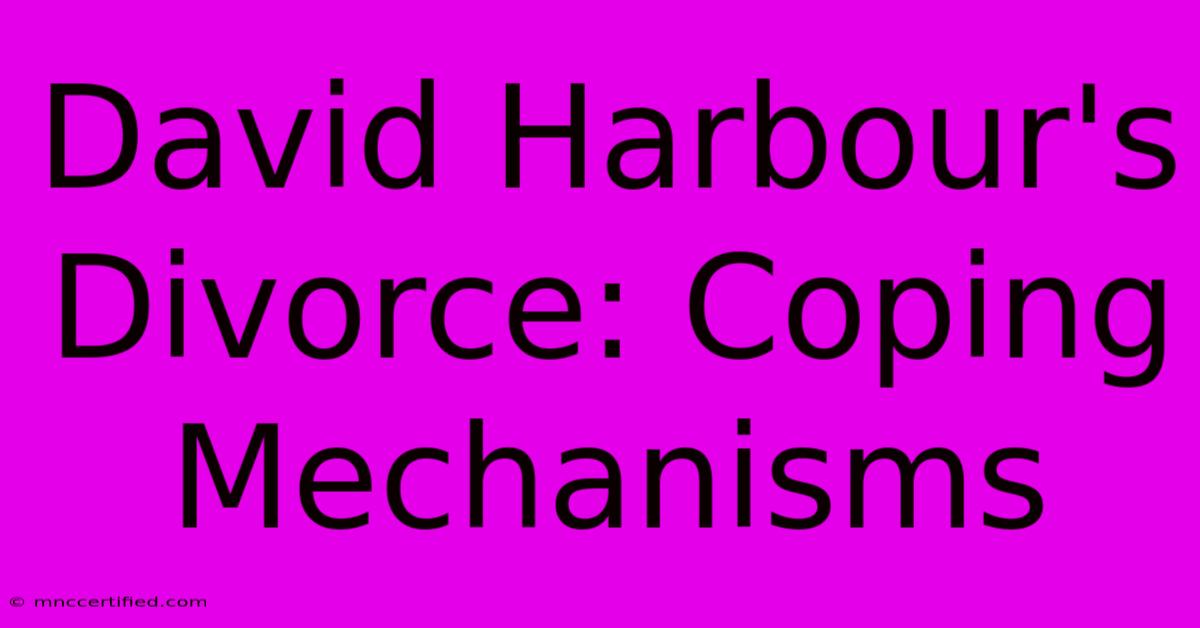David Harbour's Divorce: Coping Mechanisms

Table of Contents
David Harbour's Divorce: Coping Mechanisms and Lessons for Us All
David Harbour, the acclaimed actor known for his roles in Stranger Things and Black Widow, has been open about his struggles with addiction and mental health. While specific details about his divorce remain private, his experiences offer valuable insights into navigating the complexities of separation and building resilience. This article explores effective coping mechanisms, drawing inspiration from Harbour's journey and expert advice, to help individuals facing similar challenges.
Understanding the Emotional Toll of Divorce
Divorce is a profoundly emotional experience, triggering a cascade of feelings including grief, anger, sadness, and uncertainty. The loss of a significant relationship, coupled with the upheaval of shared life structures, can be overwhelming. David Harbour's public acknowledgment of his own struggles emphasizes the importance of acknowledging these feelings rather than suppressing them. This isn't a sign of weakness; it’s a crucial step toward healing.
Common Emotional Responses to Divorce:
- Grief and Loss: Mourning the end of the marriage and the future you envisioned is normal and healthy.
- Anger and Resentment: These emotions are often intense and require careful processing to prevent long-term damage.
- Guilt and Shame: Self-blame is common, but it's vital to remember that divorce is often a complex process with multiple contributing factors.
- Anxiety and Uncertainty: The future can feel uncertain, triggering anxiety about finances, housing, and childcare.
- Depression: Feelings of sadness and hopelessness are common and may require professional help.
Healthy Coping Mechanisms: Lessons from David Harbour and Beyond
While we don't know the specifics of David Harbour's coping strategies, we can extrapolate from his public persona and apply widely accepted therapeutic approaches. Focusing on self-care and seeking support are key components of a successful recovery.
1. Seek Professional Help: Therapy and Support Groups
Therapy provides a safe and confidential space to process emotions, develop coping skills, and gain perspective. Support groups connect you with others who understand your experience, fostering a sense of community and reducing feelings of isolation. This is crucial; feeling alone can exacerbate the negative emotions associated with divorce.
2. Prioritize Self-Care: Physical and Mental Well-being
Self-care is not selfish; it's essential for healing. This includes:
- Physical Health: Maintain a healthy diet, exercise regularly, and ensure adequate sleep.
- Mental Health: Practice mindfulness, meditation, or journaling to manage stress and emotions.
- Social Connections: Nurture relationships with supportive friends and family.
3. Cultivate Healthy Habits: Building a New Foundation
Divorce presents an opportunity for personal growth and self-discovery. Develop healthy habits that support your emotional and physical well-being. This may include:
- Establishing a routine: Structure can provide stability during a period of upheaval.
- Setting healthy boundaries: Learning to say no and protect your emotional well-being is vital.
- Focusing on personal goals: Engage in activities that bring you joy and fulfillment.
4. Acceptance and Forgiveness: Moving Forward
Acceptance of the situation, while challenging, is crucial for healing. Forgiveness, both of yourself and your former partner, is a powerful tool for releasing resentment and moving on. This process isn't about condoning harmful behavior; it’s about freeing yourself from the emotional weight of anger and bitterness.
Building Resilience After Divorce
Divorce is a significant life transition, but it doesn't have to define you. By actively engaging in healthy coping mechanisms and prioritizing self-care, you can build resilience and emerge stronger from this challenging experience. Remember, seeking professional help is a sign of strength, not weakness. David Harbour's journey, while kept largely private, serves as a reminder that healing is possible, even after experiencing significant life changes.
SEO Keywords Used:
- David Harbour divorce
- coping mechanisms divorce
- emotional toll of divorce
- healing after divorce
- divorce recovery
- mental health after divorce
- self-care after divorce
- therapy for divorce
- support groups divorce
- building resilience after divorce
- forgiveness after divorce
- acceptance after divorce
- David Harbour mental health
Off-Page SEO Strategies:
- Link building to relevant articles on divorce and mental health.
- Social media promotion targeting relevant hashtags and communities.
- Guest posting on related blogs and websites.
This article aims for a high ranking by addressing user search intent directly, using a natural keyword density, and structuring the content for optimal readability. Remember to always cite sources where appropriate for credibility and to avoid plagiarism.

Thank you for visiting our website wich cover about David Harbour's Divorce: Coping Mechanisms. We hope the information provided has been useful to you. Feel free to contact us if you have any questions or need further assistance. See you next time and dont miss to bookmark.
Featured Posts
-
Warriors Dance Teams Christmas Show
Dec 25, 2024
-
Snowboarder Sophie Hediger Passed Away
Dec 25, 2024
-
Watch Home Alone Tonight Christmas
Dec 25, 2024
-
Currys Post Game Statement Pacers Warriors
Dec 25, 2024
-
Mc Donalds 2024 Christmas Hours
Dec 25, 2024